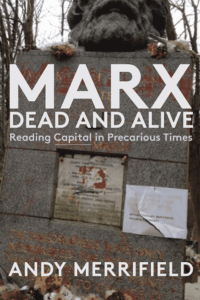Marx, Dead and Alive: Reading “Capital” in Precarious Times
REVIEWS, 16 Nov 2020
Andy Merrifield | Monthly Review - TRANSCEND Media Service
 Karl Marx saw the ruling class as a sorcerer, no longer able to control the ominous powers it has summoned from the netherworld. Today, in an age spawning the likes of Donald Trump and Boris Johnson, our society has never before been governed by so many conjuring tricks, with collusions and conspiracies, fake news and endless sleights of the economic and political hand. And yet, contends Andy Merrifield, as our modern lives become ever more mist-enveloped, the works of Marx can help us penetrate the fog.
Karl Marx saw the ruling class as a sorcerer, no longer able to control the ominous powers it has summoned from the netherworld. Today, in an age spawning the likes of Donald Trump and Boris Johnson, our society has never before been governed by so many conjuring tricks, with collusions and conspiracies, fake news and endless sleights of the economic and political hand. And yet, contends Andy Merrifield, as our modern lives become ever more mist-enveloped, the works of Marx can help us penetrate the fog.
In Marx, Dead and Alive—a book that begins and ends beside Marx’s recently violated London gravesite—Merrifield makes a spirited case for a critical thinker who can still offer people a route toward personal and social authenticity. Bolstering his argument with fascinating examples of literature and history, from Shakespeare and Beckett, to the Luddites and the Black Panthers, Merrifield demonstrates how Marx can reveal our individual lives to us within a collective perspective—and within a historical continuum. Who we are now hinges on who we once were—and who we might become. This, at a time when our value-system is undergoing core “post-truth” meltdown.
“This enchanting portrait of Marx at work, with his legendary overcoat and shuffling ways, is brilliant, informative, and beautifully written. Merrifield then puts the insights he derives from reconnecting with Marx’s writing to work to illuminate everything from the writings of Gogol and Dickens to the architectural disaster of New York’s Hudson Yards.”
______________________________________________
Go to Original – monthlyreview.org
Tags: Karl Marx, Marxism, Reviews
DISCLAIMER: The statements, views and opinions expressed in pieces republished here are solely those of the authors and do not necessarily represent those of TMS. In accordance with title 17 U.S.C. section 107, this material is distributed without profit to those who have expressed a prior interest in receiving the included information for research and educational purposes. TMS has no affiliation whatsoever with the originator of this article nor is TMS endorsed or sponsored by the originator. “GO TO ORIGINAL” links are provided as a convenience to our readers and allow for verification of authenticity. However, as originating pages are often updated by their originating host sites, the versions posted may not match the versions our readers view when clicking the “GO TO ORIGINAL” links. This site contains copyrighted material the use of which has not always been specifically authorized by the copyright owner. We are making such material available in our efforts to advance understanding of environmental, political, human rights, economic, democracy, scientific, and social justice issues, etc. We believe this constitutes a ‘fair use’ of any such copyrighted material as provided for in section 107 of the US Copyright Law. In accordance with Title 17 U.S.C. Section 107, the material on this site is distributed without profit to those who have expressed a prior interest in receiving the included information for research and educational purposes. For more information go to: http://www.law.cornell.edu/uscode/17/107.shtml. If you wish to use copyrighted material from this site for purposes of your own that go beyond ‘fair use’, you must obtain permission from the copyright owner.